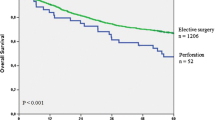Summary.
The aim of this study was to investigate postoperative und long-term results after radical tumor surgery in complicated colorectal cancers. One hundred and twenty-six (11.7 %) of 1071 patients treated for large bowel cancer between 1986 and 1997 were operated on for bowel obstruction (84; 7.8 %) or perforation (42; 3.9 %). Postoperative mortality was significantly higher in complicated than in uncomplicated cancers (19 % after bowel obstruction, 38 % after perforation, 6 % in uncomplicated cases). Development of preoperative organ dysfunction determined survival in both complications. Mortality after perforations was influenced by the degree of peritonitis and tumor stage, while patients after bowel obstruction were at greater risk in the case of cardiac comorbidity. Long-term results depended on tumor stage but not on complications. Our concept of radical tumor surgery in emergency operations was supported by the fact that long-term results of patients surviving the acute stage of complicated colorectal cancers did not differ from those of patients with uncomplicated carcinomas.
Zusammenfassung.
Ziel unserer Untersuchung war es, postoperative und Langzeitergebnisse des Operationskonzeptes einer radikalen Tumorchirurgie beim komplizierten colorectalen Carcinom zu analysieren. 126 (11,7 %) von 1.071 im Zeitraum 1986 bis 1997 wegen eines Dickdarmcarcinoms behandelten Patienten kamen wegen eines Ileus (84; 7,8 %) oder einer Perforation (42; 3,9 %) zur Operation. Die postoperative Letalität lag mit 19 % beim Ileus und 38 % bei Perforationen signifikant höher als bei unkomplizierten Carcinomen (6 %). Bei beiden Komplikationen war die postoperative Sterblichkeit beim Vorliegen eines präoperativen Organversagens erhöht. Nach Perforationen führten das Vorliegen einer diffusen Peritonitis und höherer Tumorstadien, beim Ileus kardiale Begleiterkrankungen zu erhöhten Letalitätsraten. Die Langzeitergebnisse waren nicht vom Auftreten einer Komplikation, sondern von den Tumorstadien abhängig. Das Konzept einer radikalen Tumorresektion, auch in Akutsituationen, ist nach unseren Resultaten zu befürworten, da Patienten, die die postoperative Phase überleben, keine schlechtere Prognose hatten, als jene mit unkomplizierten Carcinomen.
Similar content being viewed by others
Author information
Authors and Affiliations
Rights and permissions
About this article
Cite this article
Kriwanek, S., Armbruster, C., Beckerhinn, P. et al. Das komplizierte colorectale Carcinom. Chirurg 70, 59–65 (1999). https://doi.org/10.1007/s001040050607
Issue Date:
DOI: https://doi.org/10.1007/s001040050607




